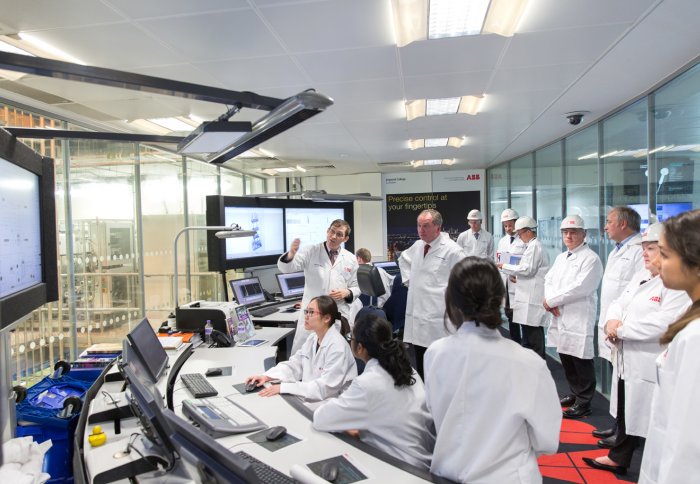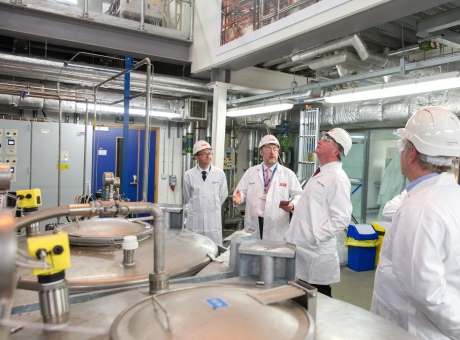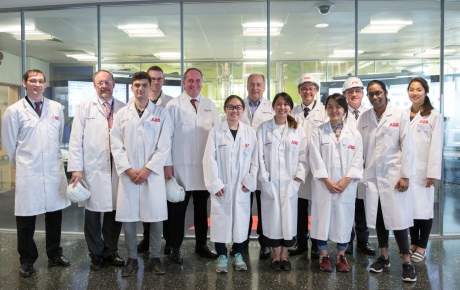Australian Deputy PM sees carbon capture tech potential at Imperial

Dr Colin Hale and students demonstrate the Carbon Capture Pilot Plant to DPM Barnaby Joyce
Imperial's Australian collaborations and global lead in carbon capture research were the focus of a visit from Deputy Prime Minister Barnaby Joyce.
Mr Joyce, who also serves as Australia’s Minister for Agriculture and Water Resources, was introduced to Imperial's research and innovation achievements, before touring the Carbon Capture Pilot Plant at Imperial’s South Kensington Campus. He met experts including Dr Daryl Williams and Dr Bradley Ladewig – both Australians – and Dr Colin Hale.
As Australia commits to reducing its carbon emissions, Mr Joyce saw how carbon capture and storage can be part of the solution. He said: “A big reason we’re here is because you’re preeminent in this space.”

Bradley Ladewig, Daryl Williams and Barnaby Joyce in the pilot plant
Mr Joyce met Imperial’s Provost James Stirling and Vice-Provost (Research) Nick Jennings, who discussed the College’s research priorities and extensive Australian ties.
Professor Jennings spoke about the College’s research, innovation and translation strenghts, student entrepreneurship and plans for White City.
He highlighted the 1,600-strong alumni community in Australia, including Australia’s oldest working scientist 103 year-old Dr David Goodall, as well as Imperial’s 110 Australian students.
The College’s Australian research collaborations range “from cricket bat design to fighting antibiotic resistance,” he said, resulting in more than 4,000 joint papers in the last five years.
Clean energy transition
The DPM was introduced to a group of students who work on the Carbon Capture Pilot Plant. These include exchange student Vanessa Gunner, who is working on a Masters between Imperial and the University of Melbourne, Australia-born undergraduate Elysia Lucas, and postdoctoral research associate Dr Lachlan Mason from Melbourne.
Chemical Engineering undergraduates Ivan Taptygin, Elise Shui, Kerissa Narine and Aireen Choo supported Senior Teaching Fellow Dr Colin Hale to demonstrate how the plant works, and some of their emergency training.

Imperial staff and students with Australia's Deputy PM Barnaby Joyce
Dr Hale, Dr Williams, Dr Ladewig and their student team explained to the DPM how carbon capture and storage is an important technologically ready tool for de-carbonising current and future power and industrial sectors.
Dr Daryl Williams, Reader in Particle Science, said: “In the drive towards a low carbon economy, carbon capture from the flue gases emitted by coal fired power stations is a serious current option for reducing their CO2 emissions. The amine solvent capture technology for achieving this is demonstrated by Imperial’s Carbon Capture Pilot Plant, and highlights future global opportunities for UK, Australian and international researchers striving to make coal cleaner.”

Nick Jennings briefed Barnaby Joyce on Imperial's Australian ties
Dr Bradley Ladewig, Senior Lecturer in Chemical Engineering, said: “Australia faces unique challenges in the transition to a clean energy future. Mr Joyce pointed out concerns around stability and reliability of supply, as well as emissions intensity, and was keenly interested to hear about the opportunities provided by carbon capture and storage.
“I was thrilled to see the high-level interest of the Australian government in the world-leading research we are conducting here at Imperial.”
After his briefing from Dr Hale, Dr Williams and Dr Ladewig on the Carbon Capture Pilot Plant, the DPM said “You’ve taught me so much now, I think I can go home and build one.”
As a parting gift, Mr Joyce – a big rugby fan – received an Imperial first XV shirt. He said “Tell the Rugby Club it’ll get a good runaround.”
Article text (excluding photos or graphics) © Imperial College London.
Photos and graphics subject to third party copyright used with permission or © Imperial College London.
Reporter
Thomas Angus [Photographer]
Communications Division
Andrew Scheuber
Communications Division